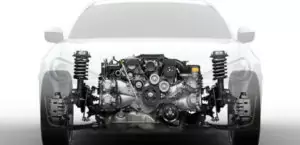The 1.8-liter diesel engine Ford RVA or 1.8 Endura-DE was assembled from 1995 to 1998 and was installed on the sixth generation of the Escort model, in a number of sources it is considered the seventh. The motor was not famous for its reliability, but it had a simple design and good repairability.
The Endura-DE line also includes internal combustion engines: RTK, RFA and RFN.
The engine was installed on:
- Ford Escort Mk6 in 1995 – 1998.
Specifications
| Production years | 1995-1998 |
| Displacement, cc | 1753 |
| Fuel system | prechamber |
| Power output, hp | 70 |
| Torque output, Nm | 135 |
| Cylinder block | cast iron R4 |
| Block head | cast iron 8v |
| Cylinder bore, mm | 82.5 |
| Piston stroke, mm | 82 |
| Compression ratio | 21.5 |
| Features | no |
| Hydraulic lifters | no |
| Timing drive | belt |
| Phase regulator | no |
| Turbocharging | yes |
| Recommended engine oil | 5W-40 |
| Engine oil capacity, liter | 5.1 |
| Fuel type | diesel |
| Euro standards | EURO 1 |
| Fuel consumption, L/100 km (for Ford Escort 1997) — city — highway — combined |
8.5 5.5 6.7 |
| Engine lifespan, km | ~210 000 |
Disadvantages of the Ford RVA engine
- The timing belt has a very modest resource, and when it breaks, the valve always bends;
- Also, many owners complain about problems with starting the car in severe frost;
- The motor suffers from oil leaks, a weak point at the junction of the upper and lower parts of the block;
- The lack of cooling here leads to rapid wear of the rings of the fourth cylinder;
- On specialized forums, several cases of destruction of the crankshaft or its breakdown from the supports are described.






